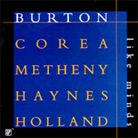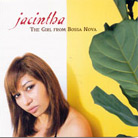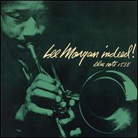![[SoundStage!]](../sslogo3.gif) The Vinyl Word The Vinyl WordBack Issue Article |
December 2004 Found on Vinyl: Like Minds, Jacintha and Lee MorganJazz reissues on premium vinyl continue to proliferate at an astounding rate. Almost every week (or so it seems) a new release or two hit the shelves -- to help deplete our wallets. And so, once again, I intend to drop my line into that ever-expanding ocean of vinyl reissues and reel in three that I hope you’ll find as enjoyable as I have. One company that adds to the sea of reissues one quality drip at a time -- as opposed to the torrent that pours forth from other companies -- is Pure Audiophile Records. One of their latest, Like Minds [Pure Audiophile PA-003 (2)], is only the third release from the company (following Karyn Allyson and Ray Brown LPs), and continues the tradition of superior jazz reissues. It also finds the company once again mining the mother lode that is the vast Concord Records vault. And, again, Dennis Cassidy -- Pure Audiophile’s head honcho -- has picked a winner.
Burton and Corea have recorded a few highly memorable albums together; Metheny has played with both Burton and Corea at various times; and Holland and Haynes have been around long enough to have played with most of modern jazz history -- from Charlie Parker (Haynes) to Miles Davis (Holland). Because they’ve all played together, they understand where each is headed musically. With all that interaction and experience, the album’s title doesn’t seem far-fetched at all. However, the greatest jazz in the world, if poorly recorded and mastered, will be almost worthless as reissue fodder. Fortunately Like Minds sounds terrific. Concord Record’s owner Carl Jefferson put a premium on good recording technique, and Dennis Cassidy researches his projects very carefully, choosing only the most deserving recordings for his reissue projects. To ensure the best pressings possible, Cassidy enlists the aid of Stan Ricker in transferring those excellent recordings to premium colored vinyl -- mine is blue, and it does look pretty spinning of the platter of my turntable. To say that Stan Ricker does a good job mastering an LP is akin to saying Da Vinci’s Mona Lisa is a pretty decent portrait. We’re talking about a master here. Thus, this record is about as good as an LP can get -- short of having been cut at 45rpm. I’m not even sure that that would make all that much difference.
As with Pure Audiophile, Groove Note lavishes mucho attention onto the smaller details, such as packaging, that aid in making their releases worth every penny of their cost. The Girl From Bossa Nova has a beautiful, deluxe (a much abused word, but accurately applied here) gatefold cover, excellent liner notes, and a very nice poly-lined record sleeve. Combined with the flat, quiet 180-gram vinyl, this release adds up to high value. Sonically as well as musically, it’s rave time. If you have heard any of Jacintha’s SACDs, you’ll think you’re already intimately familiar with the sound of her very distinctive voice. You’d be dead wrong. The Girl From Bossa Nova is a revelation. Until you’ve heard this LP, you have no idea just how significant a singer Jacintha truly is. Here, she sounds alive -- in-the-room real. It’s almost spooky. And this allows you to get a feel for how she sets up a line, using subtle inflection and/or minor variation of pitch and tempo to make each syllable come alive. She never forces her way, always remembering the gentleness of the Bossa Nova; instead she carefully and confidently navigates her way through with unerring accuracy. She sings these Brazilian songs like a native, a real testament to her talent. Backed by what has become Groove Note’s house band -- Bill Cunliffe on piano, Darek Olezkiewicz on bass and Harry Allen on tenor sax, aided by Tim Pleasant on drums, Paulinho Da Costa on percussion, and John Pisano on guitar -- Jacintha dances (and that’s exactly what it sounds like she’s doing while singing these songs) through these Bossa Nova tunes by Antonio Carlos Jobim, Luis Bonfa and others. Aided by Joe Harley’s usual superb production job, The Girl From Bossa Nova lacks for nothing musically or sonically, making its purchase a no-brainer.
His support group was made up of some of the finest young talent that Blue Note’s Alfred Lion could find: Horace Silver on piano, Wilber Ware on bass, Clarence Sharpe on alto saxophone, and either "Philly" Joe Jones or (the only veteran of the jazz wars used here) "Papa" Jo Jones on drums. Despite the lack of original music, Morgan sounds highly inspired, and his playing is enthusiastic and vivid. You’d be hard-pressed to guess, if you didn’t already know, that the leader was still a teenager at the time. He plays with maturity -- as he would throughout his productive but far-too-short career (he was murdered at age 33 in or outside the now-closed Slugs nightclub in New York). Originally recorded by the immortal Rudy Van Gelder, whose engineering prowess still sets the standard for jazz recordings today, Indeed is a classic (sorry) example of Van Gelder's work. Each instrument is clearly defined in its own space, and the tonal balance is spot-on. And despite the recording being in mono -- Van Gelder always preferred mixing to mono -- the feeling that a group of musicians is playing in front of you is unmistakable. But, as good a job as Van Gelder did recording this session, much of the credit for the sound transferred from those 45-year-old tapes to this LP lays squarely on the shoulders of Hobson and his crack mastering crew at Classic Records. Pressed on Classic’s 200-gram Quiex SV-P super vinyl -- the formula for which I’d rate right up there with the immortal JVC formula, now lost to posterity -- Indeed is everything jazz-vinyl fans could hope for. Classic has done its usual expert job of re-creating the look and feel of the original Blue Note release, from its accurate center label to the cover art. About the only way you’ll be able to tell that what you are holding isn’t a mint original is a single line on the very bottom of the back cover: "Courtesy Blue Note Records, A Division Of Capitol Records Inc. Under License from EMI-Capitol Music Special Markets." But should you miss that line, it’ll only take one listen to know that this isn't a recording that's approaching 50 years in age; it sounds way too quiet, clean, and realistic. Kudos to Michael Hobson not only for continuing to support vinyl, but also for reissuing albums that people really want to own. That all of these albums are superb releases will be self-evident as soon as you hear them, and you’ll be kicking yourself for not latching on before they go out of print. The ocean of vinyl jazz continues to offer great fishing. ...John Crossett |
|
![[SoundStage!]](../sslogo3.gif) All Contents All ContentsCopyright © 2004 SoundStage! All Rights Reserved |
 The personnel on Like Minds
-- Gary Burton on vibes, Chick Corea on piano, Pat Metheny on guitar, Dave Holland on
bass, and Roy Haynes on drums -- reads like an all-star lineup, and that’s pretty
much what it is. Although this album is nominally under the leadership of Burton, with
friends such as those here, no one needs to lead, as everyone knows just what’s
expected. So listening to any of the tracks of this double-LP set (and, boy oh boy, does
it feel good to use that term) you’ll be hard-pressed to decide who, if anyone,
deserves the leader designation. Everyone understands what’s involved in group
interplay, so egos were checked at the door.
The personnel on Like Minds
-- Gary Burton on vibes, Chick Corea on piano, Pat Metheny on guitar, Dave Holland on
bass, and Roy Haynes on drums -- reads like an all-star lineup, and that’s pretty
much what it is. Although this album is nominally under the leadership of Burton, with
friends such as those here, no one needs to lead, as everyone knows just what’s
expected. So listening to any of the tracks of this double-LP set (and, boy oh boy, does
it feel good to use that term) you’ll be hard-pressed to decide who, if anyone,
deserves the leader designation. Everyone understands what’s involved in group
interplay, so egos were checked at the door. Another company
that prefers to use a bucket rather than a hose when adding contributions to the vinyl sea
is Groove Note. This is a company that not only reissues classic jazz titles but also
issues newly recorded instant classics. This next release falls into the latter category.
Groove Note's latest, by audiophile favorite Jacintha, The Girl From Bossa Nova [Groove
Note 10263], is in and of itself a major release. For not only is this a new vinyl
issue, Groove Note did it up as a double-45rpm set. And does it sound sweet.
Another company
that prefers to use a bucket rather than a hose when adding contributions to the vinyl sea
is Groove Note. This is a company that not only reissues classic jazz titles but also
issues newly recorded instant classics. This next release falls into the latter category.
Groove Note's latest, by audiophile favorite Jacintha, The Girl From Bossa Nova [Groove
Note 10263], is in and of itself a major release. For not only is this a new vinyl
issue, Groove Note did it up as a double-45rpm set. And does it sound sweet. Finally, we come
to one of the companies whose outpouring of reissued vinyl is second to none -- Classic
Records. But don’t for one minute equate quantity with any lack of quality. One of
the projects that Classic’s Michael Hobson has always held dear to his heart is his
ongoing slate of Blue Note LP reissues. Thus far all have been faithful to the originals
-- except Hobson uses much better vinyl than Blue Note’s owner Alfred Lion and
engineer Rudy Van Gelder ever dreamed possible. One of the more recent re-releases (I
hesitate to call it the latest, as Classic seemingly has a new release every week) is Lee
Morgan’s Indeed [Classic Records BN-1538]. This was Morgan’s second album
for Blue Note, and it found Morgan, only 19 at the time but already a jazz veteran, still
searching for his voice -- and it wouldn’t be all that much longer before he found
it. As such, none of the tunes on Indeed is self-penned, which is something of an
anomaly, as Morgan became an extremely prolific songwriter later in his career.
Finally, we come
to one of the companies whose outpouring of reissued vinyl is second to none -- Classic
Records. But don’t for one minute equate quantity with any lack of quality. One of
the projects that Classic’s Michael Hobson has always held dear to his heart is his
ongoing slate of Blue Note LP reissues. Thus far all have been faithful to the originals
-- except Hobson uses much better vinyl than Blue Note’s owner Alfred Lion and
engineer Rudy Van Gelder ever dreamed possible. One of the more recent re-releases (I
hesitate to call it the latest, as Classic seemingly has a new release every week) is Lee
Morgan’s Indeed [Classic Records BN-1538]. This was Morgan’s second album
for Blue Note, and it found Morgan, only 19 at the time but already a jazz veteran, still
searching for his voice -- and it wouldn’t be all that much longer before he found
it. As such, none of the tunes on Indeed is self-penned, which is something of an
anomaly, as Morgan became an extremely prolific songwriter later in his career.